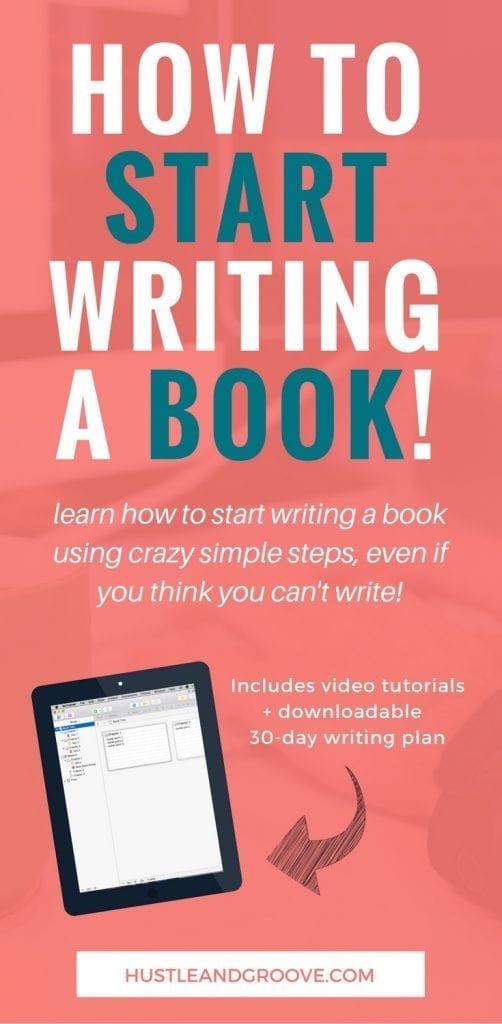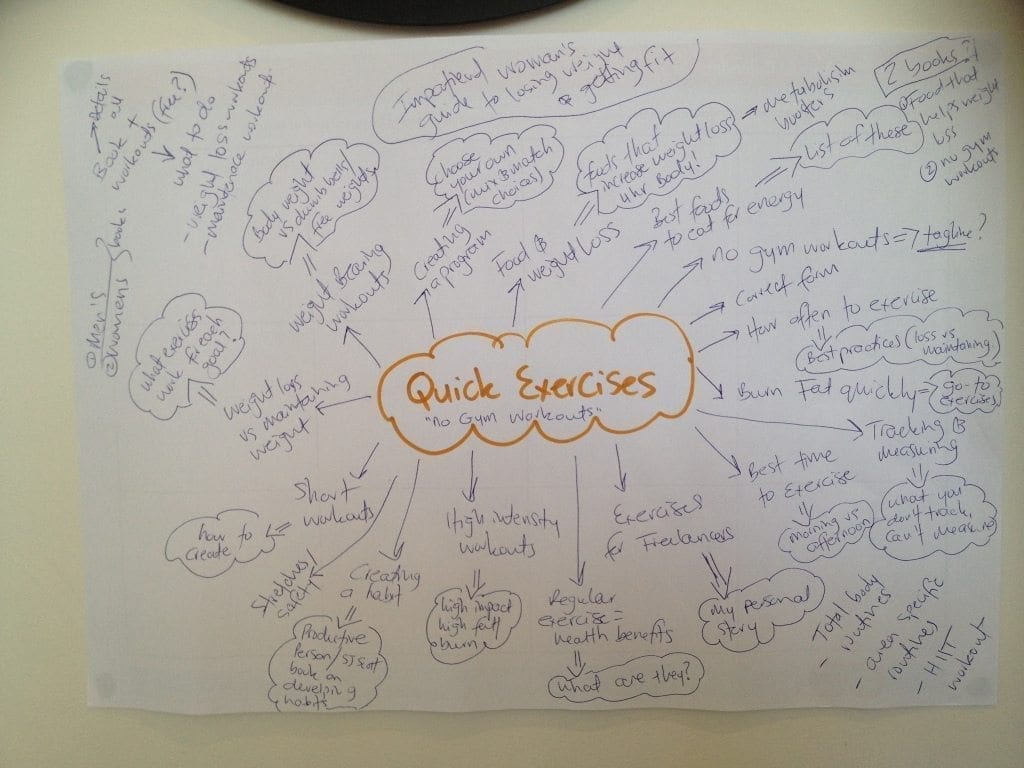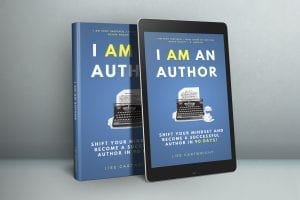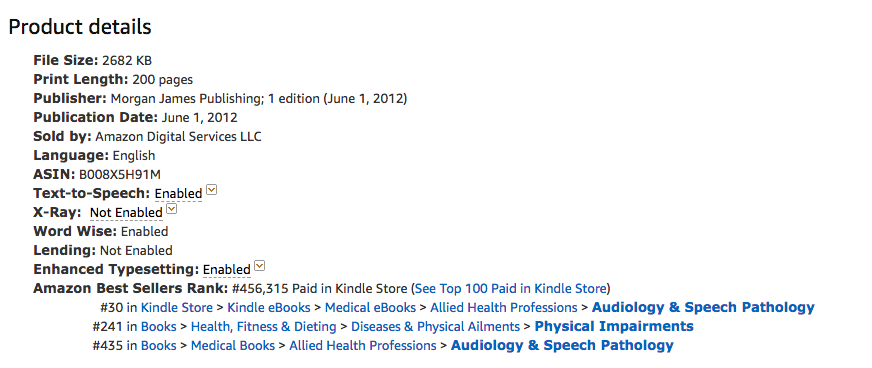It can be hard to start writing a book, particularly when you don't have the confidence to write or feel like you have nothing to write about.
I get it. I experienced similar feelings when I first thought about writing a book. Thoughts like:
“What if no-one reads my book!”
“I wasn't that great at English. People will know and leave 1-star reviews…”
“Writing a book is hard. I don't have the skills to do it.”
If any of this resonates with you, then keep reading because I'm living proof that in spite of all those thoughts and feelings, you CAN write a book, have people read it, be a success, and actually make money from it!
 Here's what I'm going to cover in this post:
Here's what I'm going to cover in this post:
- Tips on how to find your best idea to start writing a book
- How to validate your ideas to make sure your book will sell
- Why use Scrivener to outline your book
- A writing plan to follow for the next 30 days
Writing a Book? Start Here…
Well, my friend, it's D-day. You've been wanting to start writing a book for like 6 months, right? And you've been reading, and reading, and reading, and reading, and reading…. Yep. You've nailed the theory part.
Now it's time to get down to the action part, the doing. Grab a drink and your fav notebook and get ready to start your author journey.
Step 1: Brainstorm Ideas
Start at the beginning. If you think you have nothing worthy to say in a book, this process will help.
Because I can tell you, even without knowing you, that you have something special to share with the world and you're doing us all a disservice by NOT sharing it!
I call this the Discovery Method, and it goes like this:
Brainstorm like a mofo!
I know this sounds kinda simple, but brainstorming is the best way to unlock ideas you might have but hadn’t considered writing about, particularly if you've been stuck battling with Neville (you know, your inner voice/ego/mind) about whether you should start writing a book or not.
Start by grabbing a piece of paper or whatever you do to take notes, and set a timer for 30 minutes. This part of the process is super important, so don't skip the timmer.
During this time, you’re going to write down as many ideas as you can come up with that you're interested in. Don't veto any ideas, just simply write down EVERYTHING you're interested in.
Once you've done this, sleep on it. In other words, leave the list alone for 24 hours. Don't look at it.
Hide it if you have to.
Then the next day, grab your list, set the timer again for 30 minutes, and rinse and repeat.
Why does this work?
During this 24 hour period, your mind has been busy thinking about ideas to do with your book — you'll be surprised at how much comes out in this next 30-minute block.
If you're still struggling for ideas or you're still thinking you have nothing to write about, take your good self out of the house and go visit a physical bookstore. Browse all the categories you're interested in and write down book topics you see that you have an interest in.
You can take this online and do the same on Amazon.
The point of the Discovery Method is to build a large list of potential ideas that might work as a book topic!
Once you've completed this initial phase, choose the 3-5 ideas you are drawn to, or that really interest you and head on over to validate them.
Validating Your Book Topics
There are several ways that you can validate your book topics. I'm going to share them with you below.
Step 2: Amazon
Start by visiting Amazon and navigating to the Kindle bookstore > Best sellers area.
You're going to jump into the categories that you think your book idea would fit in and then you're going to look at the top 20-40 bestsellers.
Once there, you're looking for a few key areas to help validate your idea…
To validate your book idea on Amazon, here’s the rule of thumb I like to use:
- At least 500 monthly searches on Amazon
- When looking on Amazon in the Kindle categories, the Top 20 best sellers should have ABSR (Amazon Best Sellers Rank) ranks of 30,000 or less.
- You'll also want to make sure that this category and these books are actually making money. If most of the books are ranked 30,000 or less, they are receiving at least one sale a day. This is a good sign.
To find this information, you'll need to do an initial search in Amazon's search bar for your book topic. Make sure you're only searching the Kindle store.
Note the number of search results. You can see this in the top left-hand corner of the search area, as shown in the image below.
From there, navigate to each category you think your book topic fits in and open each best-selling book's sales page. Do this for at least the top 20.
Scroll to the bottom and look for the ranks and categories the book is in. You'll find this information just above the reviews section, in the Product details area (shown below).
To keep track of all the information you're gathering, make sure you set up a spreadsheet. I prefer to use Google Sheets because then I can access it no matter what computer I'm at.
Step 3: Learning Sites
Once you've completed step 2 above, it's time to head on over to the following teaching sites for some more research:
What you're looking for here is to see if there are any courses created on your book topic. If there are three or more, then this is a good sign that your topic is going to have demand beyond just Amazon. A good sign if you're looking to build a solid author business around this topic.
Can't find any courses?
Don't worry. If the numbers stack up in step 2, you're still ok to proceed. It just means that the market is prime for you to create a course too.
If the numbers don't stack up in step 2 and in step 3, then it's back to the drawing board. Head back to your list and start the validation process again.
Step 4: Survey
If you want to further validate your idea, take it to “the market”!
Uh, Lise, what are you talking about?!
I mean, go and chat to some peeps, preferably peeps in your book topic niche. You'll likely find them inside Facebook Groups or LinkedIn Groups and they are a great resource to not only validate your idea but to help you build content for your book.
You can approach this in two ways:
- Lurk in these groups and watch and listen, or
- Ask your own questions!
Tell people that you're planning on writing a book and ask a few questions without giving the kitchen sink away aka your book topic.
Phew! Are you still with me?
By now, you've probably spent the best part of 4+ hours in validation mode. Surely there's a better way?
Why yes my friend, yes there is!
Using Validation Tools
As an alternative to doing the Amazon part (which can get very time-consuming), there are tools available that will help you do this part faster.
I personally use a combination of Publisher Rocket and KindleSpy.
Validating a book idea takes me about 30 minutes, as opposed to a few hours doing the process I outlined above.
Here's how I use these two tools:
[video_player type=”youtube” style=”1″ dimensions=”853×480″ width=”853″ height=”480″ align=”center” margin_top=”0″ margin_bottom=”20″ ipad_color=”black”]aHR0cHM6Ly95b3V0dS5iZS9jN3lMWmtpZ2wtNA==[/video_player]
[video_player type=”youtube” style=”1″ dimensions=”853×480″ width=”853″ height=”480″ align=”center” margin_top=”0″ margin_bottom=”20″ ipad_color=”black”]aHR0cHM6Ly95b3V0dS5iZS9yV2NnVVFDNGdLbw==[/video_player]
Step 5: Choosing Your Book Topic
Ok, so now that you've done all this research and validation, how do you choose which book to write first?
Well, this might seem a little airy-fairy, but when you look at the options you have, which one ‘calls' to you the most? Which one are you compelled to start with?
Honestly, this is how I pick every single book I write next.
[feature_box_creator style=”1″ width=”700″ top_margin=”5″ bottom_margin=”5″ top_padding=”5″ right_padding=”” bottom_padding=”5″ left_padding=”” alignment=”center” bg_color=”#75d7e1″ bg_color_end=”#0eb9cb” border_color=”” border_weight=”” border_radius=”” border_style=”” font_size=”14″ font_font=”Montserrat” font_shadow=”none”]
Pro Tip: Start an Evernote file where you jot down all your book ideas so that you always have a source of ideas to pull from. If you're serious about having an author business, this is the best way to sustain it — regularly writing books based on your own ideas 🙂
So don't just sit there and procrastinate my friend, pick your book topic now. You have my permission to do it, even if you think you can't write.
[/feature_box_creator]
And you better not be thinking that your idea isn't good enough… because we've just proven that it is through the validation process!
No more excuses. Do it.
Start Writing Your Book
This is the best part of the whole process, in my opinion.
When I sat down to write my first book back in July 2014, I was nervous. I had butterflies in my tummy, and I'll admit that I was more than a little doubtful about my abilities to write a book that anyone would actually wanna read.
But, there's one thing I'm REALLY good at — following instructions.
Using the steps that Chandler outlined for me inside Self-Publishing School and our one-on-one coaching, I was able to sit down and start writing a book relatively easily.
How?
Continue with the following steps:
Step 6: Mind Map
Mind mapping is my favorite thing to do, especially when I can't get an idea out of my head. One mind map later, and I feel a lot lighter and clearer.
The same process works for your book idea. Now that you've validated your book idea to within an inch of its life, it's time to start bouncing ideas around.
Mind mapping is pretty simple. All you need is a piece of paper and a pen…

Allow yourself to go nuts with writing EVERYTHING you know about your book topic. No idea is dumb. Capture it all.
Prefer online tools? Check out options like Mind Meister or Lucid Chart, both are excellent options if you don't like the idea of writing on paper.
To get the most out of this process, set yourself an initial 30-minute limit. If you get to that limit and you're still writing, continue until you run out of ideas.
Leave the mind map alone for 24-48 hours and then come back to it and add to it again.
Once this process is done, it's time to start breathing some life into your book.
Step 7: Outline
By creating an outline FIRST, you set yourself up for writing success. If you've ever suffered from writer's block or dread that blank page staring back at you, or a blinking cursor, then outlining the book first will literally save you hours of writer's angst and stress.
I NEVER suffer from writer's block, because when I sit down to write a book or blog post, I'm doing so with an outline in front of me.
How do you outline? It's pretty simple:
- Start with your mind map. Add to it.
- Leave it for 24 hours, then add more to it.
- 24 hours later, review your mind map and start a new one.
- On the new mind map, group similar ideas together.
Once you've got a page with all your grouped ideas together, it's time to outline.
Here's where having a great writing software program like Scrivener, is a lifesaver.
I have used Scrivener to outline, write, format, and publish 23+ books. It is the only tool I'll ever use to create my books.
Here's my process for outlining my books using Scrivener:
[video_player type=”youtube” style=”1″ dimensions=”853×480″ width=”853″ height=”480″ align=”center” margin_top=”0″ margin_bottom=”20″ ipad_color=”black”]aHR0cHM6Ly95b3V0dS5iZS9ubEVyVlQ1ajRVRQ==[/video_player]
Once I've got the outline on my corkboard, I can then set project targets and start writing a book!
The beauty of using Scrivener to write your book is that you can make notes in each chapter, add images and research documents to folders, plus so much more.
If you haven't checked Scrivener out yet, you can grab a 30-day free trial here.
Start Writing a Book With a Plan
The one thing I've learned since starting my own business back in 2012, is that if I don't have a plan, a deadline, then nothing gets done.
I can't be productive if I don't have a goal I'm shooting for.
The same goes for when you're writing a book. If you don't have a self-imposed deadline in place, then you'll simply keep putting it off.
If you're serious about having a profitable author business, then you have to treat it like a business.
This means having a writing plan in place to get your book written in a certain amount of time.
I work with 30-day plans because I follow the 90-Day Plan format. Basically, I only ever plan 90 days in advance and when it comes to writing a book, I break that down into easy-to-manage 2-week sprints.
Generally, it takes me about 4 weeks to write a 30,000-word book, spending 1.5 hours a day, every day, just writing.
Wanna see what my writing plan looks like? Enter your deets below and grab a template for your own 30-day writing plan!
Remember, nothing will happen unless you take action and sit your bum down in your chair and start writing.
Still feeling like you're not a writer?
Guess what?
You can speak your book instead!
See that smartphone beside you (or that you're holding in your hands right now!), it's got a voice recorder in it. Use it to record each chapter and then get it transcribed… you literally don't have to do much writing at all 🙂
You're welcome.
Next Steps
Ok, my friend. It's time to stop reading and start doing. That book ain't gonna write itself (unless you're speaking it, then it kinda is, lol!)…
Use the Discovery Method to find lots of book ideas and then validate them. Once validated, mind map and outline. Then you're ready to start writing.
Writing a book has been one of the most rewarding things I've done with my life. I know it can be the same for you too.
If you want help with writing your book, check out my latest book called I AM An Author, and get started today!



30 replies to "How to Start Writing a Book"
Love this! I blog about helping writers keep writing over at http://www.thewritingpal.com. There is a lot of really great information in this post. Thanks for sharing!
Thanks for commenting Shelby, I appreciate it.
Great information! I’m looking to publish soon! Thank you for the helpful tips!
You’re so welcome Mika!
You have some wonderful tips here! So glad I checked it out. I guess I have been informal about the 24 hour thing. And I imagine your method might be more successful as I’ve always just done it in my head while walking the dogs in the morning. Problem is then I forget most of it! thanks!!!
Hi Kathy, thanks for your comments. While you’re walking your dog, why not record your thoughts rather than keeping them in your head?! Your phone has the ability to record your voice, so get to it 🙂
This was beyond helpful. Thank you for writing this!
You’re so welcome Sara, thanks for commenting!
Thanks for sharing! Great tips!
Thanks Katie 🙂
Great tips thank you!
You’re welcome Tina, glad you enjoyed them!
[…] How to start writing a book […]
Great tips as always. Thanks for an unstoppable post and well covered material!
Thanks Rhonda 🙂
Good stuff, these are things I use with my high school students when they are writing me a creative essay. I need to follow through and do them as well!
Thanks Libby, glad you found it helpful 🙂
Very helpful. Thank you for sharing.
Thanks Nilushi 🙂
This is great information for me. I have been considering writing a book, but just haven’t brought myself to start. I just don’t feel like it’s time, but I can always reference this when the time comes.
Thanks AmberLynn, writing a book is such a great feeling, but you definitely have to be in the right frame of mind to do it. You’ll know when you’re ready 🙂
Great ideas! I will definitely be using these to help get moving on writing more. Thanks!
You’re so welcome Jenn 🙂
Sounds like a great way to keep motivated as well 🙂
Thanks for your comment Courtney!
Great information! #goals
Videos were fantastic…thanks
You’re so welcome Renee!
wow! such a great post.
I really enjoyed reading this until the end. This was very useful and informative with a lot to learn. I am seriously going to apply some tips to start writing a book.
Glad you enjoyed Rahul.